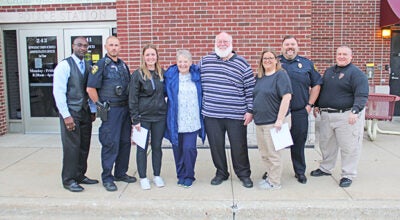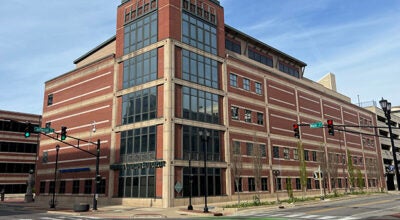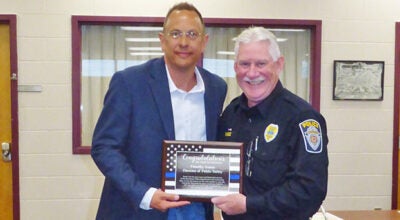SMC hosts region’s writing centers
Published 11:26 am Thursday, March 30, 2017
Approaching the 40th anniversary, writing centers encompass more than tutoring and polishing papers.
A lighthouse symbolized how writing centers “help navigate changing tides of academic life” for the 39th annual conference co-sponsored March 24 and 25 by Mattawan High School, which just saw its center axed, and Southwestern Michigan College, the first community college to host East Central Writing Centers Association in 17 years.
The Ohio State University promotes wellness. Director Dr. Genie Giaimo’s perspective is colored by living through 9/11, the Boston Marathon bombing and, last Nov. 28, a car-ramming attack and mass stabbing at her Columbus campus. The attacker, a Somali refugee police shot and killed, left 13 injured.
Central Michigan University’s Dr. Troy Hicks addressed “fake news” in, “Can I Cite That? — What counts as evidence in a digital world? For whom? In what context?”
Hicks detailed American Library Association’s six-point Framework for Information Literacy for Higher Education. “Students are consumers and creators” using social media, blogs, microblogs, wikis, mobile devices, apps and massive open online courses.
Hicks’ “hierarchy of evidence” descends from scientific law to statistical data, expert opinion, public perception and anecdotes.
“Now more than ever,” Hicks said, “we need to consider a ‘post-truth’ world of ‘alternative facts.’ We need to ask new questions about ‘evidence’ and how we use it to make nuanced, defensible claims.”
Hicks reviewed a comprehensive list of intentionally-satirical sites such as The Onion; mediabiasfactcheck.com; “reading laterally”; the New York Times’ Room for Debate; Opposing Viewpoints in Context; AllSides; Snopes; Google Keep; and Cite This for Me.
“At this point in our digital lives, it’s important we teach students to curate information,” Hicks said.
With myriad ideas to discuss, 162 presenters from 45 institutions delivered 91 presentations, from body language and burnout to branding and spotlighting diverse international populations through journalism.
Presenters from Michigan, Indiana, Ohio and Illinois included five from SMC — Stephanie Foreman, Cody Miller, Lauren Mackey, Gail Shirey and Natalie Anagnos.
Mattawan’s Kyle Boswell spoke about creating supportive Professional Learning Networks, using social media to collect, communicate, collaborate and create with connected colleagues. Boswell moderates biweekly Twitter chats at 8 p.m. Thursdays.
“Hit by a car four and a half years ago while walking my dog,” she underwent spinal fusion surgery to avert paralysis from the waist down.
“I received an intense reminder of the power of connections,” Boswell said. “My transition back to work in January was one of the most difficult experiences of my life. PLNs allow us to overcome obstacles, brainstorm across miles and engage in deep discussions that help us grow professionally. We found out this week Mattawan made the call to close our writing center at the end of the school year after eight years. Saying we’re devastated would be the biggest understatement of my career. In the midst of preparing for this conference, we were dealing with grief associated with losing something we poured ourselves into creatively. When one of us falls, we all feel it,” Boswell said.
President Sherry Wynn Perdue of Oakland University entreated her colleagues to respond.
“We know the power of collective action,” Perdue said.
Skyline High School, Ann Arbor, was the only secondary presenter besides Mattawan.
Lansing Community College’s Jill Reglin said, “The (national organization at its first conference in New Orleans) saw itself as something of a labor union, offering professional support to those whose positions were in crisis. (At Mott Community College, 1996) I saw the writing of refugees, single parents my age and returning adults twice my age. At 27, I was charged with creating a writing center at one of Michigan’s largest community colleges. Community colleges’ open-door access levels academia’s playing field. ‘Student support’ might include childcare and food pantries. LCC is hiring 20 ‘success coaches’ with backgrounds in social work, international relations and counseling to guide students to resources. Staffing is our biggest challenge, but a true opportunity not to overlook. We just hired a peer writing assistant native to Arabic whose second and third languages are French and English. She was one of two trilingual candidates.”
“The cyclical rotation of a lighthouse’s ever-present beacon of light, refracted by mirrors and glass, changes in appearance depending on climate,” Reglin said. “When waters get rough, we focus directly in front of us, trying to save ourselves from capsizing. But if we can remember to look upward and out, the beacon will guide us into safe harbors. We take turns traversing rough channels and tending the light for each other. The keeper is sometimes a lonely figure warning of dangers and sounding the alarm when fog becomes dense, but reminds us safety is within reach in the large, secure professional community we formed with one another.”
Dylyn Hazen, Kent State University; and Sammie Osborne, Miami University, were recognized as outstanding tutors from more than 20 nominees.
SMC Vice President of Instruction Dr. David Fleming opened the conference eulogizing Chairman Emeritus Dr. Fred L. Mathews, “a tireless fighter for 50 years for things he thought necessary for students to succeed. He personified belief in education until his passing” (on March 19).
SMC Tutoring Support Services Coordinator Louis Noakes, conference co-chair, said, “The whole campus supported (hosting), including 33 tutors from my staff, who were so impressed with your presentations. Money can’t buy the kind of training you brought to SMC.”
Southwestern Michigan College is a public, residential and commuter, community college, founded in 1964. The college averages in the top 10 percent nationally for student academic success based upon the National Community College Benchmark Project. Southwestern Michigan College strives to be the college of first choice, to provide the programs and services to meet the needs of students, and to serve our community. The college is accredited by The Higher Learning Commission of the North Central Association of Colleges and Schools and is a member of the American Association of Community Colleges.






